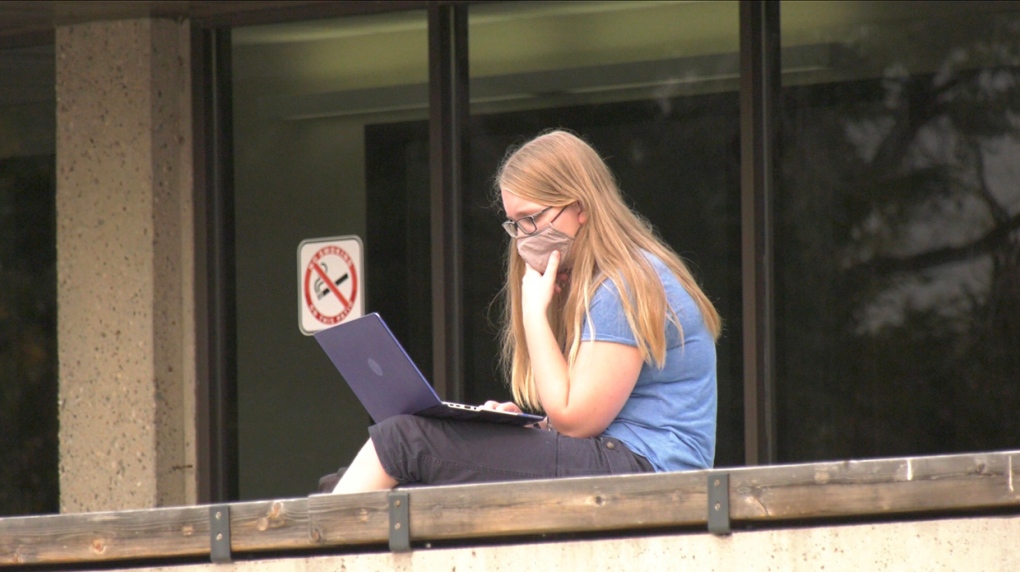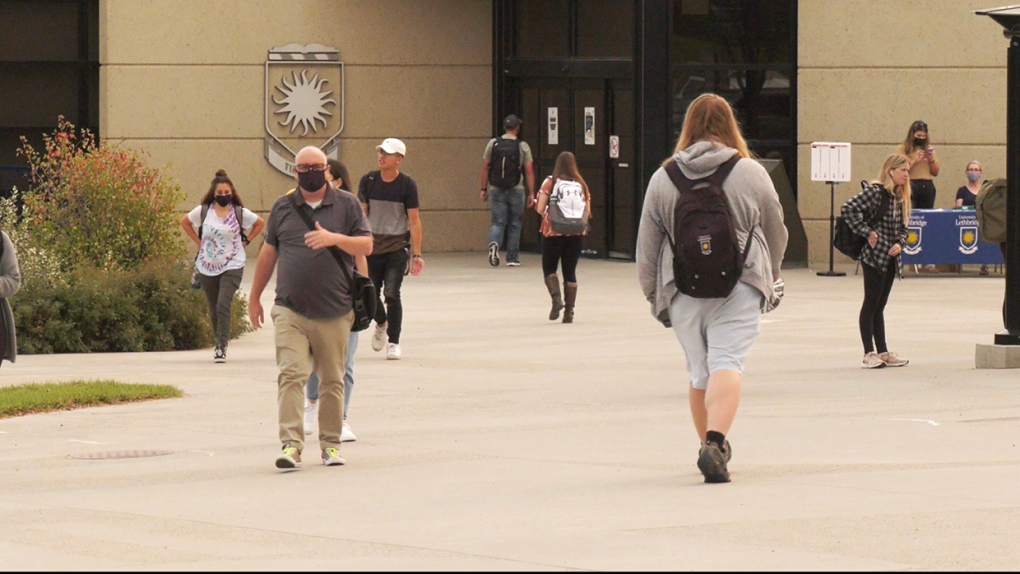University of Lethbridge professors criticize Alberta's post-secondary plan in new report
 The report written by two Lethbridge professors claims the provincial plan is "ill-advised and the planned changes, if implemented, will have a radical and perhaps even dangerous impact on Alberta’s post-secondary system."
The report written by two Lethbridge professors claims the provincial plan is "ill-advised and the planned changes, if implemented, will have a radical and perhaps even dangerous impact on Alberta’s post-secondary system."
The province is looking to shake up the post-secondary system in Alberta over the next 10 years with its 'Alberta 2030: Building Skills For Jobs' plan.
According to Alberta's Minister for Advanced Education, Demetrios Nicolaides, a strategic plan for the sector hadn't been completed in at least 15 years.
"Where are the pain points? Where are the areas that we need to focus on to create a stronger system? In a nut shell, that is what the Alberta 2030 plan is about," he said.
The province's plan aims to:
- Improve access and student experience by "Ensuring all Albertans have access to high quality post-secondary opportunities and that the student experience is coordinated and integrated,"
- Develop skills for jobs by "Ensuring every student has the skills, knowledge and competencies to enjoy fulfilling lives and careers and that they have greater transparency around labour market outcomes,"
- Support innovation and commercialization by "Contributing to Alberta’s innovation capacity by supporting post-secondary research and strengthening its commercialization potential to create new knowledge, develop future skills and diversify the economy,"
- Strengthen internationalization by "Becoming a leading destination for top talent to drive the growth of skills, ideas and innovations locally and globally,"
- Improve sustainability and affordability by "Providing institutions greater flexibility to generate own-source revenue and strengthen student aid,"
- Strengthen system governance by "Modernizing governance of the system to increase collaboration and drive outcomes,"
CRITICIZED BY PROFESSORS
But that plan is now coming being criticized by two university of Lethbridge professors who have come together to create a new Parkland Institute report.
 According to Alberta's Minister for Advanced Education, Demetrios Nicolaides, a strategic plan for the sector hadn't been completed in at least 15 years.
According to Alberta's Minister for Advanced Education, Demetrios Nicolaides, a strategic plan for the sector hadn't been completed in at least 15 years.
Professor of sociology at the University of Lethbridge and former Director of the Parkland Institute, Dr. Trevor Harrison, and economics professor Dr. Richard Mueller, are challenging the province's data that led to budget cuts, layoffs, low student enrolment and an increase of corporate control.
Their report claims the provincial plan is "ill-advised and the planned changes, if implemented, will have a radical and perhaps even dangerous impact on Alberta’s post-secondary system."
Notes from the report include:
- There is no plan to add the projected 40,000 new student spaces the system will require by 2028 nor plans to increase access for Alberta students from the lowest participation rate to the national average.
- Post-secondary institutions will be subjected to increased corporate control over which programs will be offered and what research will be funded.
- The $430 million total project cut to the post-secondary education budget will result in much higher costs for students to attend post-secondary.
- Government cuts to Alberta’s institutions has resulted in massive layoffs for staff and faculty and will have a significant impact on the quality of post-secondary education in the future.
It also calls on the province to increase public funding, rehire staff, and provide free tuition for the first two years of post-secondary education.
"We know that a well-educated population is a higher-earning population and is a vehicle for an improved economy," said Dr. Harrison.
"Albertans need to challenge the government to invest in our post-secondary education system so that we can support more students to get a high-quality education and help diversify and strengthen the economy."
Harrison claims the $430-million cut in the last provincial budget will mean even higher tuition rates for students, something the University of Lethbridge Students Union (ULSU) is worried will push students away from the province.
"The average debt load of students is increasing and you know, they're being hit on all fronts in terms of the cost of education," said ULSU V.P. External Ryan Lindblad.
"Not only is that bad for students who are currently enrolled in post-secondary education, but it's a terrifying prospect for those who are in high school and middle school and want to pursue that in the future."
However, Nicolaides said the province's Alberta 2030 plan wasn't created in a vacuum and included a long consultation period with numerous stakeholders.
"We developed it with incredible consultation. Over 150 one-on-one interviews, round tables, surveys, town halls, and we developed it in true collaboration and consultation,"
"There are students associations endorsing the plan, university presidents endorsing the plan and other critical stakeholders."
Nicolaides added the Parkland Institute chose not to participate in those consultations, and is only now weighing in with its criticism.
CTVNews.ca Top Stories

Aviation experts say Russia's air defence fire likely caused Azerbaijan plane crash as nation mourns
Aviation experts said Thursday that Russian air defence fire was likely responsible for the Azerbaijani plane crash the day before that killed 38 people and left all 29 survivors injured.
Police identify victim of Christmas Day homicide in Hintonburg, charge suspect
The Ottawa Police Service says the victim who had been killed on Christmas Day in Hintonburg has been identified.
Teen actor Hudson Meek, who appeared in 'Baby Driver,' dies after falling from moving vehicle
Hudson Meek, the 16-year-old actor who appeared in 'Baby Driver,' died last week after falling from a moving vehicle in Vestavia Hills, Alabama, according to CNN affiliate WVTM.
Pizza deliverer in Florida charged with stabbing pregnant woman at motel after tip dispute
A pizza deliverer in central Florida has been charged with pushing her way into a motel room with an accomplice and stabbing a pregnant woman after a dispute over a tip, authorities said.
Raised in Sask. after his family fled Hungary, this man spent decades spying on communists for the RCMP
As a Communist Party member in Calgary in the early 1940s, Frank Hadesbeck performed clerical work at the party office, printed leaflets and sold books.
Cat food that caused bird-flu death of Oregon pet was distributed in B.C.: officials
Pet food contaminated with bird flu – which killed a house cat in Oregon – was distributed and sold in British Columbia, according to officials south of the border.
Unwanted gift card in your stocking? Don't let it go to waste
Gift cards can be a quick and easy present for those who don't know what to buy and offer the recipient a chance to pick out something nice for themselves, but sometimes they can still miss the mark.
India alleges widespread trafficking of international students through Canada to U.S.
Indian law enforcement agencies say they are investigating alleged links between dozens of colleges in Canada and two 'entities' in Mumbai accused of illegally ferrying students across the Canada-United States border.
2 minors, 2 adults critically injured in south Calgary crash; incident was preceded by a robbery
Multiple people were rushed to hospital, including two minors, in the aftermath of a serious vehicle collision on Thursday morning.































